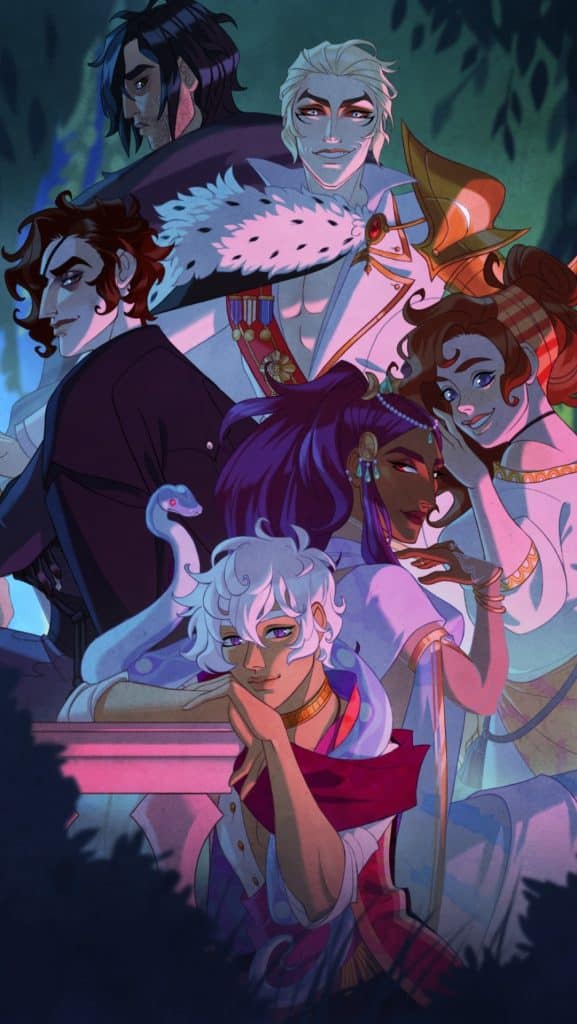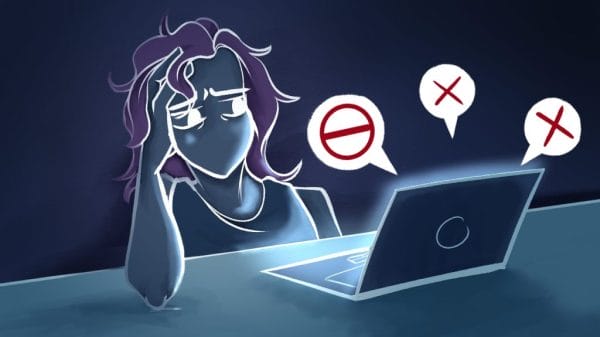Dating Simulators – or even Romance Centered games in general – get a bad rep. People tend to look down on them, and public opinion tends to be that those who play them are socially inept, and sometimes ‘weird’, for enjoying them.
There seems to be an idea that these people substitute their real-life need for romance with partners created from code and confined to their screens.
It’s a common trait assigned to players of Dating Sims – but is it a fair one?
I decided to do some research into the world of Dating Sims and romance in video games in an attempt to answer this question whilst also trying to ascertain where the controversy stems from.
My research took me to various subreddits, and academic articles, and actually engaging with some of the most popular games myself to deeper understand this often ostracised world.
I focused my research on the female experience of Dating Sims, and whilst I did engage with non-binary and male players, I decided to write from the female perspective – there’s been plenty already written about male-(centered) Dating Sims, and a surprising lack in female!
If you’re unfamiliar with dating sims – not to worry, we’re going to cover the basics.
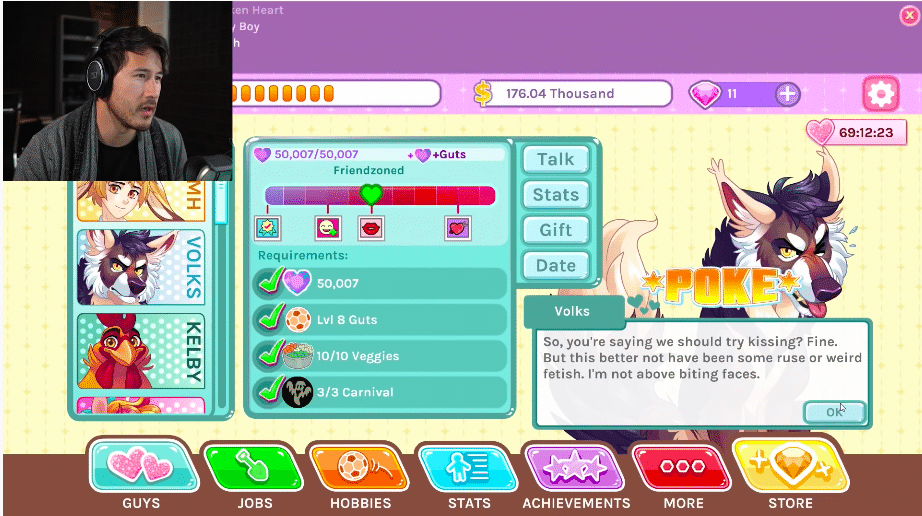
What Is A Dating Simulator?
The name probably gives it away, but a Dating Simulator is a video game in which the player actively courts one of the romanceable characters, the end goal being: entering a relationship with them. The games vary a lot, with some having the romance aspect secondary to other plot points, and others completely revolving around the romantic storyline.
However, the above is a very watered-down synopsis of what actually constitutes a Dating Sim – the reason for this is that ‘Dating Sim’ is actually a very loose term that covers a number of other, more specific, subgenres.
‘Dating Sim’ or ‘Dating Simulator’ is the English term that’s often used to describe the Japanese game genre of ren-ai gēmu (恋愛ゲーム), which are essentially romance-driven games.
Dating Simulator has almost become a bit of an umbrella term for English speakers, with many different types of games often being encompassed within it. However, not all romance games are Dating Sims, in fact, a lot of Visual Novels (VN) – that are technically adventure games – get landed with the term despite not actually being one. For the sake of this article, however, I will be including games often associated with Dating Simulators, even if they are technically not one so long as they have a dating simulator theme.
Going into this research, I’ll be honest, I knew little beyond the term otome and otome games. What I then discovered, was that actually, I didn’t even know what ‘otome’ meant!
Thankfully, a helpful commenter on Reddit pointed me in the right direction to brush up on my terminology by linking me to this Twitter thread.
Otomemuke (乙女向け)or otome games, fall under Joseimuke (女性向け)- media that is created and catered to a young female demographic.
Otome games have some specific traits, and I’ve discovered that a lot of app stores mislabel games as being otome that actually aren’t.
Key components of otome games are specific routes with romanceable characters that lead to an ending with them (think ‘happily ever after’) and feature special computer graphics specific to each ‘route’.
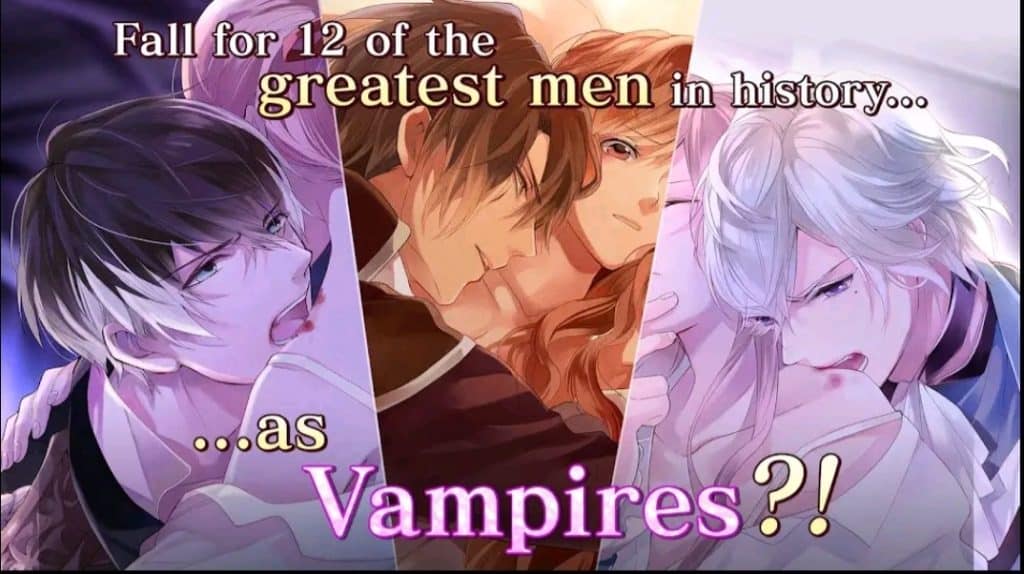
Popular otome games include Mystic Messenger (however, Mystic Messenger is a Korean game, but it fits the criteria of otome) and the Ikemen Vampire Series.
Another popular type of game is Yumemuke ( 夢向け), which I discovered is the correct term for a lot of the games I had initially believed to be otome games.
Yumemuke differs from Otomemuke as it includes a blank-slate MC, meaning players can imagine their ideal MC without having to play through as a pre-determined one. Often this means simply giving a name, and your character having no visuals and in some cases, gender-neutral pronouns (or your preferred ones!)
Another key difference in Yumemuke is that the games don’t follow specific routes, and don’t have an ending. Despite characters insinuating their romantic interest or love, it doesn’t build to a romantic climax. Popular examples of this game include Obey Me! and The Arcana, both games that again, I have researched and played myself that we will be covering later.
Why Are They So Controversial?
Dating Sims are not the most respected of games – people have a lot of prejudice towards them and the people who play them.
Whilst, like anything in life, there are questionable Dating Sims that exist, and some players may exhibit some negative traits – can we really generalize a whole genre of games and the people who play them so easily?
A lot of Dating Sims are seen as, for lack of a better word, ‘icky’, and players, unfortunately, find themselves negatively connoted as being weird, socially inept, or in more extreme circumstances, unable to find real-life romantic partners.
It’s quite a gross generalization that I’ve discovered to be far from the truth when discussing the topic with players on Reddit.
Not everyone who enjoys Dating Sims is an anti-social pervert, and not all Dating Sims games are sexually explicit either – in fact, many are quite the opposite and are incredibly wholesome.
I found myself reminiscing about another misjudged media that I had to defend my enjoyment of once-upon-a-time: anime.
When I was at school and would talk about anime, many people would immediately turn up their noses as to them, all anime was that of…the unsavory kind.
It was an automatic ‘no’. An ‘I refuse to acknowledge there might be some genuinely good aspects of it’ dismissal.
I’ve come to the conclusion that Dating Sims – or even romance media in general – has a similar miasma of negativity surrounding it when it comes to general perception.
Romance as a genre is undeniably looked down on. Look at Romance books for example – they are consistently ragged on, and there is still a niggle of shame for many who do read them due to how they are perceived by others.
Why is romance ‘icky’ to so many? Why are so many on an anti-romance campaign?
Well, it could be due to the fact that a lot of Romance books are not fantastic, or at the very least, the worst ones attract the most attention. Bad writing and questionable content marry together in a lot of cases to create books that no one would actually admit to enjoying.
However, the above is true for many genres – bad writing isn’t exclusive to Romance – and there are a lot of fantastic Romance books showing that it can be done well.
Yet, Romance continues to be an ostracised genre.
This was a point I turned to Reddit to find insight on, and the Redditors did not disappoint.
In response to my question about Romance being quite an ostracized genre, one commenter made a good point that Romance is almost akin to fan service, and this for many people becomes an automatic issue. I had never once considered Romance as a form of fan service, but it was certainly an interesting perspective to come upon.
Another commenter suggested that Romance is so brutally criticized because, generally speaking, it’s a genre that’s heavily catered towards women, and as a ‘feminine’ media, more likely to be scrutinized as low-brow content.
I found this to be an excellent observation, and when I read the comment, it clicked in my head – how many movies do we see women enjoying ‘trashy’ Romance novels used to comedic effect in a way that makes the character seem silly and mediocre?
Furthermore, even the existence of the term ‘mommy-porn’ towards erotic fiction intent for women carries a connotation of being intellectually base.
Could this be a factor as to why these games are so harshly critiqued? After all, as a form of Joseimuke, they are at their heart, intended for the enjoyment of females.
The Player’s Perspectives & My Experience
So, I mentioned before that I took to good old reliable Reddit for my research, in which I posed the question ‘why do you like Dating Sims/Romance Games?’ and ‘what aspects don’t you like about them?” and I, admittedly, was surprised by a lot of the responses I got.
Whilst some of the commenters straight up said they enjoyed the games because they get to fawn over cute boys (which, honestly, fair enough) others offered some really well-thought-out responses.
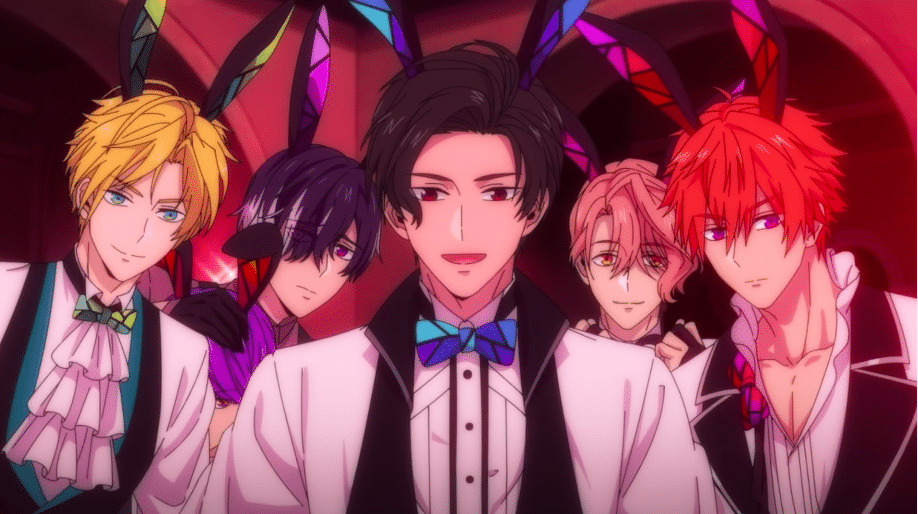
Perhaps the main reason, or the one that came up the most, is that players felt the games offered an intimate and dynamic story experience that watching a show, reading a book, or manga, lacked.
The reason for this is that the whole experience has you as an active participant, rather than a passive observer – as the player, they felt they had control over the story which heightened the experience to a level that cannot be reached by the pre-determined plots of a book or film.
I thought to myself that this was an obvious, yet brilliant, point. We play video games in order to take decisive action and have an input on the story – to make our mark in the world confined to our screen.
Why does the main story or goal of the game being Romance make this experience obsolete or less authentic than any other gaming experience?
In fact, a lot of games that I particularly enjoy have similar Dating Sim mechanics in them – look at the Dragon Age series, in which relationships with other characters have to be earned by raising your intimacy with them through optimal dialogue choices & agreeable plot decisions.
Isn’t this an element of a Dating Sim in a ‘real game’?
Another point commenters made was that they found the games visually appealing. As a lot of these games come from Japan, they tend to be very anime-stylized. As someone who likes anime, this is probably the biggest appeal for me personally, and it was something I enjoyed when playing the games myself.
Obey Me!, one of the three games featured in this article, is quintessentially anime. One of the biggest attractions for me in this game was the card collecting system, in which each character card you collected had intricately drawn designs of the character, often covering a range of styles (thanks to plenty of guest artists designing for the game!)
Perhaps a niche thing to pick up on, but this was probably my favorite part of this game – I’m a sucker for video games that utilize cards in a stylistic way. I loved when Dragon Age Inquisition used Tarot Cards for the characters, and I loved the introduction of Gwent in The Witcher 3. I just find cards aesthetically pleasing, what can I say.
Another game that I picked up was The Arcana, an interactive visual story that, I learned, is a Yumemuke game (do you remember the difference?). Off the bat, this game appealed to me – the distinctive visuals, the mystical setting, the inclusion of TAROT CARDS – it felt right up my alley.
So, I gave it a go, and whilst I didn’t get too far, I could tell from my limited playtime that writing-wise, this was a cut above some of the other games I’d looked into.
The writing is actually really good, and the characters were attractive and interesting – they felt fully realized as opposed to the admittedly Flanderized characters in Obey Me!.
However, through this game, I came face-to-face with some of the less desirable traits of these games: paywalls.
The issue of paywalls in order to choose the ‘optimal’ route in this game became quite an annoyance – and it’s not a complaint that I alone have either.
This was something that was brought up in my Reddit thread that a lot of players found infuriating – especially when paywalls are used in a way that hinders your experience of the story.
For example, in most of these games or VNs, you have dialogue options that each lead to different routes, scenes, and in some cases, endings.
Some games however lock the better options behind a paywall, meaning that in order to choose the dialogue option that is going to give you the more interesting story experience, you’ve got to cough up the cash.
Yes, this was infuriating and honestly hindered my overall experience of the games. I get it – these games are free and have to make money somehow, but I would be lying if I said it didn’t impact my overall enjoyment and experience of them.
Another issue that commenters brought up to me was that they felt a lot of games suffered from bad writing, repetitive storylines, and often, a lack of character progression and depth.
As my experience in playing was too limited to really comment on this myself (I had, maybe, 5 days of actually playing them during my non-working hours), I had to rely on some subreddits for a deeper understanding of this.
I don’t want to bash specific games – it’s not the point of this article – but it seems that in a lot of cases, characters exist to fulfill a role and don’t evolve much from their individual archetype.
When it came to positive character progression, a lot of commenters said they found that VNs (Visual Novels) tended to handle this aspect better, as they are more plot & story focused as opposed to shoe-horning in romantic situations.
In saying that – most of the people I discussed these things with still enjoyed the games they were playing. It was refreshing to have such an open conversation with them where they were able to outright state the aspects they loved, but also highlight the more problematic and negative parts too.
Speaking to these people really highlighted to me how unfairly labeled the players of these games are – they were intelligent individuals who gave thought-provoking responses and engaged in genuine discourse without turning to insults or becoming defensive.
Is Enjoying Dating Sims Really That Weird?
Overall, I’m going to say that people enjoying Dating Sims = not as weird as it’s made out to be.
Sure, like everything, you’ll find people who take their interest too far and let it impact their real life.
But isn’t that true for literally everything?
Furthermore, is someone enjoying a game, whether it’s romantic or not, and becoming invested in the characters any more strange than the parasociality prevalent in celebrity culture?
Parasocial relationships, as coined by Donald Horton and Richard Wohl in 1956, is the concept of a face-to-face relationship between spectator (‘fans’) and performer (‘celebrities’). This face-to-face relationship is an illusion, but it causes a striking psychological effect in that synthetic relationships of intimacy are created through mass media – no direct experience or real-world meetings.
Essentially, the representation of a celebrity creates an intimacy with the fan without any physical contact.
And this psychological effect, I would argue, transcends that of celebrities – I would argue it extends to fictional characters in other forms of media too.
We’ve all seen the memes of young women lamenting that their favorite male book character doesn’t exist and has ‘ruined’ men for them. Characters, in all media, can facilitate some level of parasociality between them and the spectator.
Whether it’s a character from a book, a game, a TV series, or even a celebrity crush – after all, celebrities are, in a sense, characters of their own making – a false sense of intimacy is established through the use of media.
Now that I think of it in this context – I fail to see how enjoying Dating Sims is any less agreeable than virtually any other media.
The Future of Dating Sims
Speculating on the future of anything is exciting in this day and age as technology rapidly advances.
With AI becoming increasingly sophisticated, it makes me wonder how long will it be before conversing with an AI is near indistinguishable from talking to a real person.
Once we reach this point (or maybe we already have?) – how will this impact Dating Sims? At what point does it transcend being a simulation game and become something more?
Furthermore, with the rise in virtual reality, and impressive robotics – dare I even let my mind wander down this road?
How will the future of Dating Sims – or even just dating – be impacted by this? Could we see more people falling for AI characters over real people?



